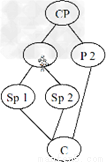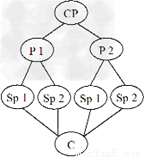题目内容
You often fi nd somebody who works around you complaining(抱怨) all the time, don't you? 1. About 70% of Americans say being around nonstop complainers sometimes has a bad influence on them. Luckily, here are 4 tips to help form positive patterns.
nd somebody who works around you complaining(抱怨) all the time, don't you? 1. About 70% of Americans say being around nonstop complainers sometimes has a bad influence on them. Luckily, here are 4 tips to help form positive patterns.
1.Self?awareness
When a negative(消极的) thought pops into your mind, immediately correct it. Instead of telling yourself “That's a nice shirt, but I can't afford it,” change the message to “That will look great with my black pants when I can afford it.” 2.
Of course everyone complains sometimes. But the less frequently you complain, the better you will feel.
2.Distance yourself
3. Excuse yourself and go somewhere quiet, somewhere outdoors in the fresh air. Think of something pleasant before returning. You have to take this seriously because negative people can and will pull you into the quicksand.
3.Don't try to change complainers
If you find yourself trapped in a group of complainers in a meeting or at a social event, simply choose silence. Let their words bounce off you while you think of something else. Attempting to stop the complaining can make you a target. 4. If someone says, “I hate Mondays; weekends are too short,” try to think, “I'm glad I rested up over the weekend, so I'm ready to make some improvement on that big project.”
4.5.
When someone is shouting at you angrily, throw the responsibility back at them by asking, “So what do you intend to do about it?” In most cases, complainers don't really want a solution(解决方法). They just want to speak them out. If you make them aware that they themselves have to find the solutions, they will leave you alone and find someone else to complain to. If so, you will be happy.
A.Find solutions
B.Change responsibility
C.You have got a lot of company.
D.By doing this, it will lead to positive behaviors.
E.But you can redirect the discussion in your own mind.
F.Whenever possible, escape from negative conversations.
G.You will never know what they are going to talk about.
 培优好卷单元加期末卷系列答案
培优好卷单元加期末卷系列答案 一线名师权威作业本系列答案
一线名师权威作业本系列答案根据短文内容,从短文后的选项中选出能填入空白处的最佳选项。选项中有两项为多余选项。
How to Love Your Parents
Even if you think that your parents are mean-spirited at times, loving your parents is a normal and fulfilling part of life. You love them for the fact that they created you, raised you, and are in part a source of who you are. Here are some ways to love your parents.
1.A gentle “good morning” and “I love you” will warm a coldest heart. Remember that they brought you into this world. Without your parents, we might still wander at an unknown corner in an unknown world.
Respect them more and cherish these moments. You can use these moments to learn from them for when you're off on your own. It's OK to get angry but angry actions don't help you or your parents. Act calmly, cool off, journal about your feelings, or talk to a friend.2.
Obey their requests. It will make your attitude better and earn you more respect from them. It may seem like you are going through hell when you don’t get what you want or you have to clean. However, you had better remember they keep a roof over your head when it’s cold, raining, snowing, or too hot. Understand that parents are human beings and make mistakes.3.Since you can forgive your friends, why not forgive your parents?
Keep company with them. Do things with your parents like watching TV, or go somewhere with them.4.Listen to their old stories and learn from them. You will find they are your teachers in this way or another.
Some people simply may not be able to love their parents.5.Seek help if you are being abused in any way. Parents do not have a right to harm you.
A.Forgiveness is the key. |
B.Tell them you love them every morning. |
C.Parents will in turn express their love to you. |
D.After this, share your feelings with your parents. |
E. Anyway, spend as much time with them as you can.
F. Please remember parents are as important as friends.
G. There can be realistic reasons for this, family violence for example.


 B.
B. 
 D.
D. 
 ed D. hated
ed D. hated